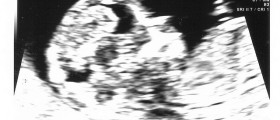
Generally, sonograms are made in the second trimester of pregnancy, but here are some reasons why you might have an early ultrasound. Very early ultrasounds have to be performed trans-vaginally, because the regular abdominal ultrasounds do not show as much detail during the embryonic stage. If you undergo one of these, a special transducer that is inserted into the vagina is used.
When performed in the very early stages of pregnancy, ultrasounds are normally done because of some indication that something is wrong with the pregnancy. Symptoms that can result in an early ultrasound include vaginal bleeding, spotting and cramping, or sharp, persistent abdominal pains. Both of these can point to miscarriage or an ectopic pregnancy.
Early pregnancy ultrasounds can also confirm the viability of a pregnancy and determine the gestational age. If you had irregular periods and are not sure when you fell pregnant, an early ultrasounds may be recommended because it is easier to determine the age of the fetus or embryo earlier on in pregnancy. If no heartbeat is detectable at this early stage (six to seven weeks or before), this does not have to be a cause for worry it can simply not be seen yet. I've had a few early ultrasounds when I have started bleeding. There is nothing scary about a trans-vaginal ultrasound, but if you are going in because of bleeding, you always hope that the ultrasound technician will say that everything is OK with your pregnancy.
To be honest, I have known that I was going to miscarry as soon as I noticed bleeding with my miscarriages, so the news that the babies were too small for their gestational ages and had no heartbeat did not come as news. But the ultrasound itself was much the same as later ultrasounds I have had with successful pregnancies, with the difference that the transducer was inserted vaginally.

















Your thoughts on this
Loading...